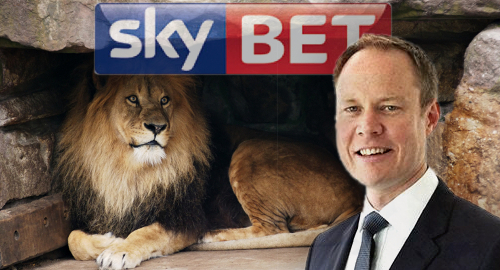 The CEO of UK-licensed online gambling operator Sky Betting & Gaming stuck his head into a parliamentary lion’s den on Tuesday to defend the betting industry’s right to impose customer account restrictions.
The CEO of UK-licensed online gambling operator Sky Betting & Gaming stuck his head into a parliamentary lion’s den on Tuesday to defend the betting industry’s right to impose customer account restrictions.
Tuesday saw the All-Party Betting & Gaming Group (APBGG) hold its latest seminar to discuss all the things gambling operators do wrong. Tuesday’s seminar, held at the House of Lords, was rhetorically titled “Are Bookmakers Unfairly Closing Customer Accounts?’ (Seems the original title ‘Are Bookmakers Evil?’ was deemed insufficiently objective.)
The seminar heard from three speakers; Sky Bet CEO Richard Flint, Racing Post editor Bruce Millington, and Simon Rowlands, chair of the Horseracing Bettors Forum (HBF), which was established three years ago to advocate for winning punters whose accounts had either been closed or subjected to severe wagering limits.
Flint (pictured) came armed with statistics that showed 97% of Sky Bet’s 1m+ horseracing punters had no restrictions on their account, while 2% had potential winnings capped at £1k for major races, and an elite/unfortunate 1% whose winnings were capped at £100.
Flint reminded the MPs in attendance that his company wasn’t “a public service” and the company reserved the right “to manage our commercial risks and liabilities” by declining major wagers from punters “who we have a reasonable belief will be unprofitable for us in the long term.”
Flint noted that if winning punters were allowed to bet without restrictions “the net result would be worse odds for everyone else.” Flint also denied that Sky Bet closed accounts of winning punters, saying closures only occurred as a result of fraud or problem gambling behavior.
The HBF’s Rowlands suggested the UK adopt minimum betting limits (MBL) like those in Australia, which require race bookies to accept wagers up to a certain limit, regardless of whose account they’re placed from.
Flint wasn’t entirely averse to the notion of the UK adopting MBL, but suggested a two-tier system – in which punters who sought best odds guarantees would need to forego their right to MBL – might work better.
Rowlands agreed that “no frills accounts” might be the way forward, but also wanted bookmakers to be required to tell punters in advance what type of behavior leads to account restrictions or closure “so that those behaviors can be explained or changed.” On this subject, Flint was in agreement.
The HBF issued its charter last December, which called for a MBL of £500. Flint noted that Sky Bet’s current maximum for its most-restricted accounts was £100, but said he’d be “happy to discuss where in the middle we might meet.”
The Racing Post’s Millington noted that the number of restricted accounts appeared to be on the rise, something he claimed “threatens to harm the general popularity of horseracing, which is something that is in nobody’s interests.”
Lord Lipsey warned the betting industry that it was in danger of repeating its experience with fixed-odds betting terminals (FOBT), i.e. ignoring repeated government warnings to curb their worst excesses until the government decided it had no choice but to impose a harsh corrective.
There’s no question that the UK gambling industry currently feels a bit like soldiers on a Dunkirk beach, with the UK Gambling Commission doling out record fines and threatening operators with license reviews as part of the regulator’s new consumer protection focus.
The Guardian quoted Flint speaking after the seminar, in which he acknowledged that the betting industry, “reputationally, isn’t in a good place and you’ve have to be an unusual person to disagree with that.”